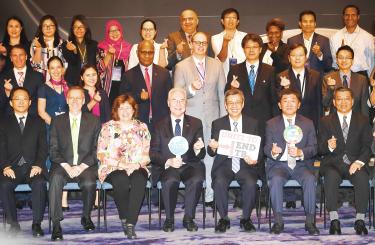The US supports Taiwan’s participation in the World Health Assembly (WHA), which is to be held in Geneva, Switzerland, from May 20 to 28, former US secretary of health and human services Tom Price and American Institute in Taiwan Director Brent Christensen said in Taipei yesterday.
Their remarks were made at the opening ceremony of the International Workshop on the Programmatic Management of Drug Resistant Tuberculosis, a four-day event that was organized by the US, Taiwan and Japan.
It is the sixth public health training workshop held under the US-Taiwan Global Cooperation Training Framework.
Price, who attended the WHA in 2017, where he expressed his strong support for Taiwan’s participation in all aspects of the meeting, said in his remarks that he came to Taiwan to reiterate his conviction and support.
“The world cannot succeed in improving the health of all unless all are able to participate in the strategic development for solutions and their implementation,” he said, adding that loosening border restrictions have increased the chance of cross-border transmission, potentially endangering people around the world.
Taiwan has a particular need for disease prevention in the Indo-Pacific region, but due to politics, it has been excluded from full participation in the WHA’s technical meetings and activities, Price said.
Citing a provision of the WHO constitution that states: “The enjoyment of the highest attainable standard of health is one of the fundamental rights of every human being,” Price added: “Taiwan should not be an exception.”
Taiwan has much experience and skill to offer to the international disease prevention system, he said.
Its wealth of experience in emergency responses to natural disasters could benefit the WHO’s emergency health program, while its National Health Insurance has achieved universal health coverage, and medical professionals from around the world have benefited from Taiwan’s medical training, he said.
“As a recipient of foreign aid, a provider of international humanitarian assistance and a democratic nation, Taiwan’s participation in the WHO will help foster early realization of the WHO’s vision of health for all,” Price said, adding that it would benefit nations around the world and in turn make the WHO more effective in preventing disease.
The US’ Taiwan Relations Act has sustained a close partnership between the two nations, as well as a long-standing history of friendship, trade, cultural exchange, and commitment to democratic values and human rights, he added.
Taiwan, with its unwavering determination to participate in international medical cooperation and position itself as a professional and pragmatic ally, should be welcomed into the WHO as a valuable partner, Price said.
Christensen cited US Secretary of Health and Human Services Alex Azar as saying: “Since health crises do not respect borders, it is difficult to reconcile the global community’s shared concern over cross-border infectious diseases while excluding representatives of the 23 million people of Taiwan.”
“Taiwan, as a responsible global citizen, has much to contribute to efforts to address infectious disease and many other international health concerns,” Christensen said.
“Recognizing this, the US and other like-minded countries will continue to press the WHO to put global health above politics and allow Taiwan to once again participate in the WHA,” he added.
Minister of Health and Welfare Chen Shih-chung (陳時中) said that strong international support is based on Taiwan’s long-term efforts in public health, proven by its achievements such as its treatment of multiple drug-resistant tuberculosis.
The treatment is complicated and takes one-and-a-half to two years, but Taiwan has achieved a success rate of about 82 percent, compared with only about 54 percent globally, he said.
Due to Taiwan’s excellent performances in preventing communicable and non-communicable diseases, the US and Japan are very supportive of the nation’s participation in the WHA, Chen added.
Source: Taipei Times - 2019/05/01





















